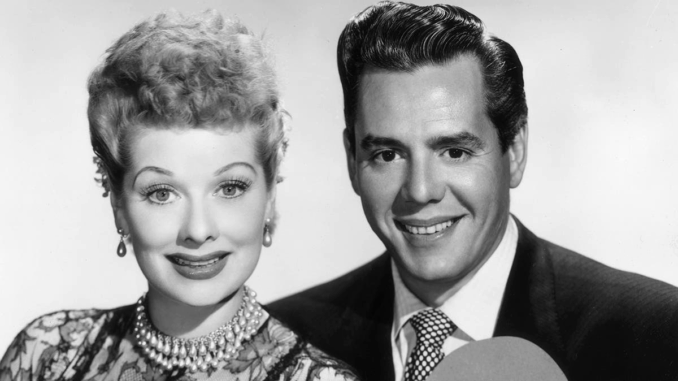
The Marketing Genius Behind “I Love Lucy”
The title of a show is more than just a name; it’s a promise to the audience, a hook that either draws them in or pushes them away. For one of television’s most iconic series, “I Love Lucy,” the title is a perfect encapsulation of its enduring appeal. But why “I Love Lucy” and not “I Love Lucille”? According to the show’s co-creator, star, and business mastermind, Desi Arnaz, the decision was a deliberate and strategic one, rooted in a savvy understanding of branding, marketing, and the nuances of audience perception. It was a choice that transcended personal affection and became a masterstroke of business genius.
The Origin of a Title
When Desi Arnaz and Lucille Ball were developing their sitcom, they were coming off a successful radio show called My Favorite Husband. That show was a hit, but they knew that television required a different approach. The show’s premise was a simple one: the life of a married couple, with the wife constantly getting into humorous scrapes. The initial idea for a title was something more generic, perhaps focused on the marriage itself, but Arnaz had a more personal and, ultimately, more effective idea.
The title “I Love Lucy” came from a line Desi often used to express his affection for his wife in real life. It was an affectionate, personal phrase. However, translating a private sentiment into a public title required careful thought. Arnaz’s rationale for choosing “Lucy” over “Lucille” was multifaceted, touching on aspects of audience connection, marketing, and the very nature of a sitcom’s hero.
It’s All in the Name: Lucy vs. Lucille
Arnaz’s reasoning, as he later explained, was simple yet profound. The choice was not about a lack of love for his wife’s full name, but about the specific emotional resonance of “Lucy.”
First, simplicity and accessibility. “Lucy” is a short, friendly, and easily remembered name. It’s an Americanized, approachable name that everyone could connect with. “Lucille,” while a beautiful name, is longer and more formal. Arnaz understood that in the new, fast-paced world of television, titles needed to be instantly recognizable and easy to remember.
Second, branding and character. Desi Arnaz was a pioneer in television branding. He didn’t just see a show; he saw a product. The name “Lucy” was already a beloved character from their previous radio show, My Favorite Husband. The name “Lucy Ricardo” had a certain familiarity. By calling the show “I Love Lucy,” they were not just celebrating Lucille Ball the actress, but “Lucy,” the character. It gave the title an air of being about the character, a relatable, funny woman, rather than a more formal show about a celebrity named Lucille. This was a crucial distinction for the audience. Viewers would tune in to see what Lucy was up to, not necessarily to watch a show about Lucille Ball.
Third, the personal touch. The name “Lucy” was also what Desi called his wife in real life. It was a term of endearment. By titling the show “I Love Lucy,” it felt as though Desi himself was speaking to the audience, sharing his affection for the character and, by extension, the woman who played her. This created a powerful and authentic connection with the viewers. The title felt personal, intimate, and warm, a perfect reflection of the show’s tone. It was a brand built on love and authenticity.
The Title’s Enduring Legacy
The decision to name the show “I Love Lucy” proved to be a stroke of marketing genius that had far-reaching consequences.
- Audience Connection: The title immediately created an emotional bond. It told the audience, “This is a show you are going to love, and it’s about a character you are going to love.” It was a simple, declarative statement that proved to be a powerful draw.
- Merchandising and Branding: The title was perfect for merchandising. The name “Lucy” could be used on products, from dolls to lunchboxes, without the more formal “Lucille” feeling out of place. It was a brand that could be easily marketed and sold, something Arnaz was keenly aware of as he built Desilu Productions into an entertainment empire.
- SEO and Searchability: While they didn’t have SEO in the 1950s, the concept is the same. The title “I Love Lucy” is highly searchable and memorable, ensuring that the show would remain a top result in a crowded television landscape for generations.
Desi Arnaz understood that the business of show business was not just about creative genius, but also about smart marketing. He saw the potential for the show to become a cultural institution and chose a title that would facilitate that growth. His decision was not a casual one, but a strategic move that helped propel “I Love Lucy” to the top of the ratings and secure its place in television history.
In the end, the choice wasn’t about whether he loved Lucille, but about how he could make the world love Lucy. And by choosing the more personal, accessible, and brandable name, he succeeded beyond anyone’s wildest dreams.
